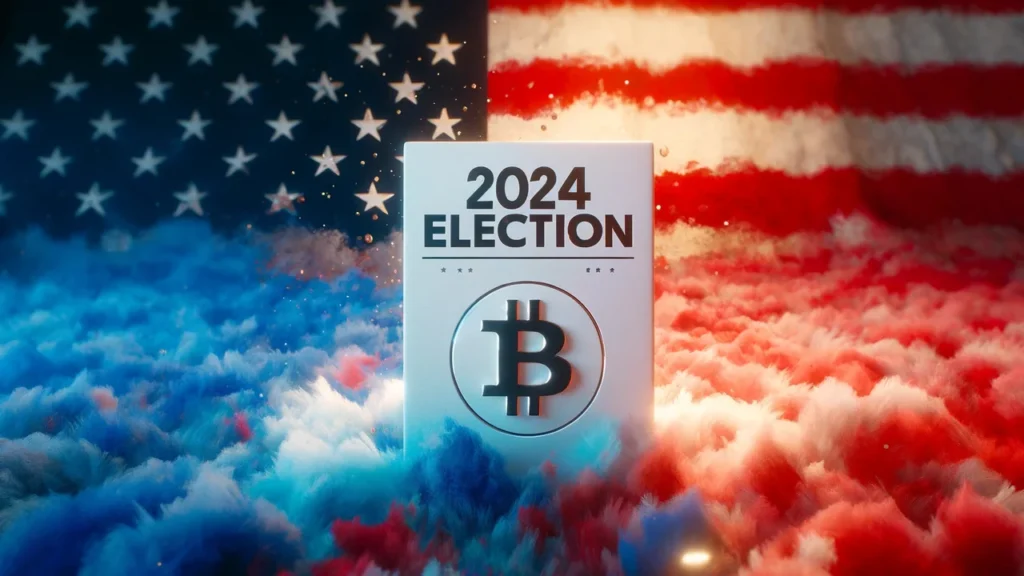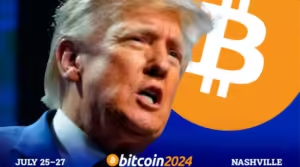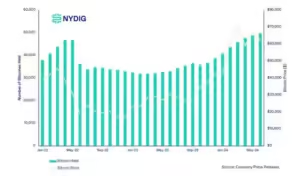Bitcoin Increasingly Relevant in 2024 US Election: Grayscale Survey

QUICK TAKE
- Nearly half of U.S. voters plan to include crypto in their portfolios, per Grayscale’s survey.
- 32% of voters are more open to learning about crypto investments.
- Inflation is the top concern for 28% of voters, influencing interest in Bitcoin.
- Geopolitical tensions and major crypto developments, like spot Bitcoin ETF approvals, drive voter interest.
As the 2024 U.S. presidential election approaches, Bitcoin and other cryptocurrencies are emerging as significant factors in voter considerations. A recent survey by Grayscale, a leading cryptocurrency asset management firm, reveals a growing interest among American voters in incorporating digital assets into their investment portfolios.
Grayscale’s survey highlights that approximately 47% of U.S. voters expect to have some form of cryptocurrency in their portfolios. This underscores the increasing prominence of digital assets in financial planning and political discourse. The maturation of Bitcoin as an asset and macroeconomic factors, such as inflation and geopolitical instability, are contributing to this trend.
One of the key findings of the survey is that 32% of voters are now more inclined to learn about cryptocurrency as an investment option. This shift in attitude is likely influenced by the economic challenges facing the country. With inflation identified as the most pressing issue by 28% of respondents, many are turning to Bitcoin as a hedge against rising prices and economic uncertainty.
Geopolitical tensions and polarized political climates are also playing a role in driving voter interest towards Bitcoin. Additionally, significant developments in the cryptocurrency space, such as the approval of spot Bitcoin exchange-traded funds (ETFs), have made Bitcoin more accessible and attractive to mainstream investors.
Grayscale’s survey suggests that the crypto market’s evolution will increasingly be considered by policymakers and candidates in the upcoming election. Former President Donald Trump, currently a leading Republican candidate for the 2024 election, has publicly expressed his support for the U.S. crypto economy. Trump emphasized the need for the U.S. to establish a leadership position in the global crypto race, reflecting a growing recognition of the sector’s importance.
Mark Cuban, a billionaire entrepreneur and crypto advocate, responded to Trump’s pro-crypto stance by suggesting that the outcome of the 2024 election could be significantly influenced by the current administration’s regulatory approach to cryptocurrency. Cuban’s remarks on social media highlighted the role of regulatory figures like Gary Gensler, Chair of the Securities and Exchange Commission (SEC), in shaping public and political sentiment towards crypto.
The survey, conducted before Trump’s announcement, indicates that voters are divided on which political party is more favorable to cryptocurrency policies. An equal percentage of voters, 30% each, view both the Democratic and Republican parties as having the most favorable stance towards crypto. This split suggests that both parties will need to address cryptocurrency regulation and policy as part of their campaign strategies.
In the meantime, the price of Bitcoin has seen a modest increase, rising 1.3% to $68,700 in the past 24 hours according to The Block’s crypto price dashboard. This price movement reflects the ongoing interest and investment in Bitcoin amid broader market and political developments.
The 2024 election is poised to be a pivotal moment for the cryptocurrency industry, with voter interest and candidate positions on crypto likely influencing both policy directions and market dynamics. As digital assets become more ingrained in financial systems and voter considerations, their impact on political campaigns and election outcomes is set to grow.
Grayscale’s findings underscore the necessity for candidates to develop informed perspectives on cryptocurrency and its role in the future economy. As voters increasingly look to crypto as a viable investment and hedge against economic uncertainties, the political landscape will need to adapt to this evolving financial reality.



